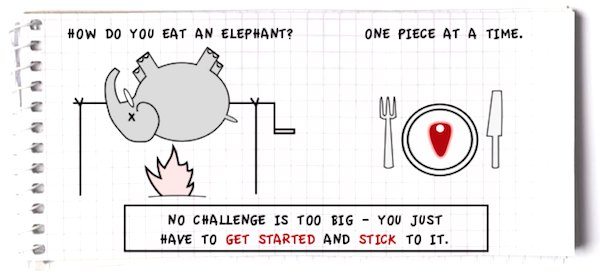Success Advice
Success….And What It Really Takes To Achieve It
So what does it really take to reach success? There are a lot of myths, the “he says”, “she says” out there but does anybody really have the answer? Success is subjective and has a different definition for each individual.
So let’s take a look through the ages at what is considered as “success”, and what is needed to reach a level of high achievement in various areas of our lives.
Geniuses Aren’t Born….. They’re Made
Books like The Da Vinci Curse by Leonardo Lospennato does a good job of summing up a problem of our time: that anyone striving to be a universal genius will inevitably fail. Because today, unlike in Da Vinci’s time, there’s so much competition out there in every field that only people who devote themselves to one subject are successful. Anyone who wants to be a professional high flyer, the “Father of the Year,” a star violinist, a globetrotter and an art connoisseur all at once should either rethink his priorities or feel satisfied about being incredibly mediocre in each of these fields. After all, it’s rare for a genius to be an all-rounder.
The secret trick: lots of practice and even more mistakes.
Alleged geniuses like Mozart, Goethe and Picasso are not famous the world over for their unique inborn gifts: they were simply lucky enough to be born with a certain amount of talent that they could then cultivate with a whole lot of hard work and dedication.
Anyone who wants to emulate a genius should take note of the fact that neither Mozart nor Einstein changed his profession every couple of years. One reason why Steve Jobs was so successful was that he put all his energy into one thing – and in the process sacrificed his chance of ever winning the “Father of the Year” award. It’s not to say that this path doesn’t have potholes, traffic and detours, but instead that only people who experiment without fear of failure and accept that they can learn from it are bound to produce great things.
Napoleon and the light bulb: getting rich by thinking?
Over 100 years ago, Napoleon Hill asked himself whether the success of outstanding personalities could be explained by a formula. Did they all use the same toothpaste? Did they all follow the same traveling priest? Hill’s answer, which he used as the basis for his book Think and Grow Rich, was far more rudimentary: for him, success and wealth were the consequence of having a clear goal and a burning desire to achieve it. And so, we can reinforce what we already knew about Mozart, Einstein and Jobs:
They all worked hard and were ready to accept mistakes and failures.
Even after more than 10,000 failed experiments, Thomas Edison was not discouraged from achieving his goal of inventing an electric light source. He was driven by the desire to make his dream a reality. After years of hard work, he finally succeeded with the invention of the light bulb. Writer Fannie Hurst’s story is similar: she had to cope with over 36 rejections before a single short story was published in a newspaper. Once that happened, her career as a successful novelist and playwright took off. Her burning desire was stronger than the frustration she felt about various rejections – and she was ultimately rewarded with success.

But all this raises a new question: if the path to success is so obvious, why are there so few people who take it?
Keeping all your options open is the road to mediocrity.
Dan Ariely’s book Predictably Irrational talks broadly about why we human beings use our gift of rational thinking and decision-making so infrequently. Or, to give a concrete example, why we promise ourselves we’ll stop eating sweets so we can look good in a bathing suit, yet, as soon as we’ve filled our shopping carts with fruits and vegetables at the supermarket, we still break down and throw in a chocolate bar on our way to the cash register. Or why, once we’ve fulfilled our dream of having a Porsche, we want a Ferrari. Or, finally, why we put off making decisions and keep all other options open in the meantime, even if it means taking the road to mediocrity or, worse, to a state of constant dissatisfaction.
People are obsessed with keeping their options open, even when it hurts them in the long run. We humans try to keep our options open as much as possible: in our education, our careers and our choice of romantic partner. Some might say that, in an uncertain world, it makes sense to leave open as many avenues as possible, but not making a decision also carries consequences. A person indecisive between two career paths, say architecture and IT engineering, may not whole-heartedly pursue either, and hence end up a mediocre architect or programmer.
Which, in turn, raises the question of how to solve this dilemma. Although countless books have an answer to this question, at the moment we’d like to focus on one classic and one recent bestseller.
Efficiency vs. effectiveness: a small, but subtle difference.
Stephen R. Covey’s book The 7 Habits of Highly Effective People is a classic in the advice and productivity genre. Like Napoleon Hill, Covey investigated what it is that makes people who have made extraordinary achievements different from others. The book relies on mantras such as “first thing’s first” and “sharpen the saw,” i.e., it encourages readers to prioritize and keep themselves balanced. He argues that, in order to have enough time to do so, you have to understand the difference between efficiency and effectiveness:
Many people work towards meaningless goals. They simply worry about being efficient rather than effective. Being efficient, i.e getting the maximum amount done in the shortest amount of time, is pointless if you don’t know why you’re doing it. Not knowing what’s really important to you and what you’re working towards is like climbing a ladder which is set against the wrong wall. To avoid this, it is important to first be clear about your long-term goals. To this end, it can be useful to ask yourself the Funeral-Questions:
What do I want people to say about me at my funeral? What sort of person do I want to be remembered as? What do I want to be remembered for?
That’s why answering these (admittedly somewhat morbid) questions shouldn’t be too difficult for anyone who wants to put Leo Babauta’s The Power of Less into practice.
Productive minimalism, or: why less is more
In just a few years, Babauta has become a guru of productive minimalism. Babauta – once an unhappy, overweight, chain-smoking “Jack of all trades, master of none” – is now a living paradigm of minimalism, practicing yoga, eating healthily, writing, and spending time with his family. His success speaks for itself, and happiness seems to literally ooze out of him. His advice sounds as simple as it does plausible:
Living without restrictions is like shopping without a credit limit. Because the only way we end up concentrating on what’s truly important is when we’re forced to budget. In short, budgeting helps us stop wasting time and energy on things that aren’t actually worth it. By consciously limiting ourselves, we create space for important things and get rid of the unimportant ones. For example, by not taking on unimportant projects, we give ourselves time to spend with our loved ones.
In summary, we recognize that people can only truly be geniuses or achieve success if they work hard and consciously choose certain options over others. Veering off the paths of mediocrity and taking drastic measures is worth it, as Ariely describes in his book Predictably Irrational:
In 210 BC, after the Chinese commander Xiang Yu had ferried his army across the Yangtze River, he set fire to his own ships. He did this to show his troops that retreat was not an option. In response, they fought so ferociously that they won nine battles consecutively.
Think about it, have you ever made such a gutsy, all-or-nothing decision or do you know someone who has?
If so, we’d love to hear about it in the comments. Your story just might inspire someone else to take action!
Entrepreneurs
The Six Pillars That Ground Purpose-Driven Leadership (The Berenyi Life Blueprint)
When high performance starts to feel hollow, these six leadership pillars rebuild clarity, stability, and long-term success.

Throughout my years coaching leaders, I’ve seen firsthand how many high-performers hit a point where the external success is growing, but the internal clarity is shrinking. (more…)
Life
Why Moving to a New City Can Change Your Mindset
Discover how moving to a new city boosts neuroplasticity, builds resilience, and reshapes your mindset

Relocation is always a challenge. Rebuilding and restarting your life requires you to step outside of your comfort zone. (more…)
Business
DIY vs Delegate: The Real Reason You’re Burned Out
Doing everything yourself feels productive until it quietly becomes the reason your business can’t scale.

You know that moment when your brain has 37 tabs open and every tab is screaming “urgent”? That’s the DIY life when it starts to crack. (more…)
Change Your Mindset
The Hidden Reason You Can’t Stay Consistent
If motivation keeps failing you, the real issue isn’t discipline. It’s the identity shaping your habits and long-term success.

Success often looks like a time-management problem. You buy a planner, set reminders, and hope that next week will be different. For a few days, it works. Then stress hits, motivation drops, and old patterns return. (more…)
-

 Business4 weeks ago
Business4 weeks agoEntrepreneur’s Guide to Pay Stubs: Why Freelancers and Small Business Owners Need a Smart Generator
-

 Business4 weeks ago
Business4 weeks agoThe Salary Shift Giving UK Employers An Unexpected Edge
-

 Scale Your Business4 weeks ago
Scale Your Business4 weeks ago5 Real Ways to Grow Your User Base Fast
-

 Business4 weeks ago
Business4 weeks agoThe Simple Security Stack Every Online Business Needs
-

 Finances4 weeks ago
Finances4 weeks agoWhy Financial Stress Is One of the Biggest Barriers to Personal Growth
-

 Business3 weeks ago
Business3 weeks agoWhy Entrepreneurs Should Care About AI Automation Testing
-

 Business3 weeks ago
Business3 weeks agoWhy Smart FMCG Entrepreneurs Outsource What They Can’t Automate
-

 Business2 weeks ago
Business2 weeks agoWhat Every Business Owner Should Know Before Investing in API Integration





























22 Comments